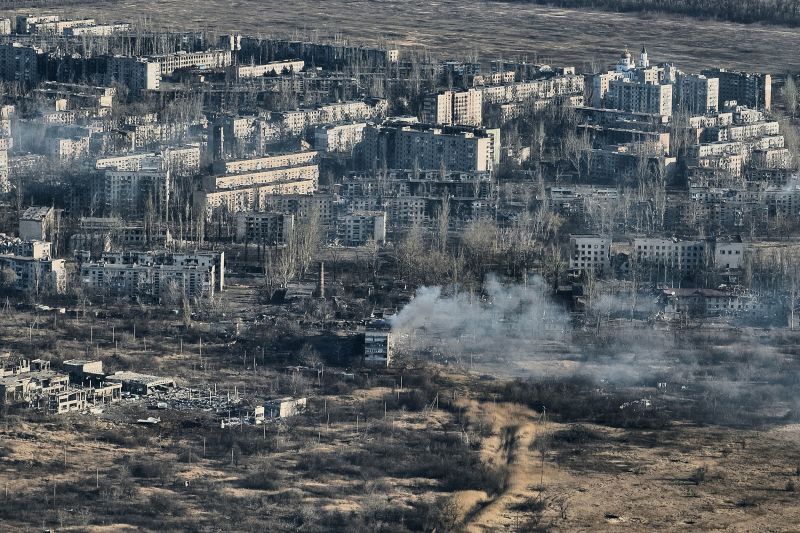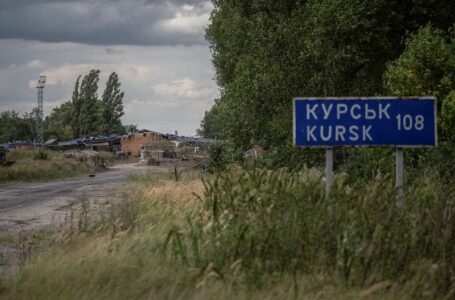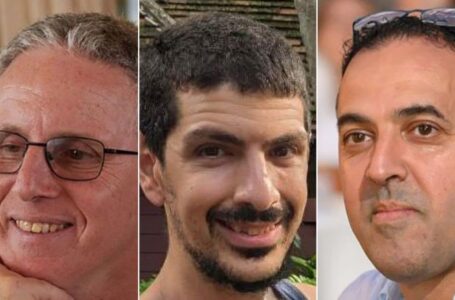As Trump pushes for ceasefire talks, Ukraine sees Kursk as a potential bargaining chip
Enemy is ‘coming from all sides:’ Ukraine’s troops face ‘hellish’ conditions as Russia throws all it has at town of Avdiivka


A Ukrainian drone spots Russian soldiers hiding amid the remains of what was once someone’s home, in the middle of a lunar-like landscape of charred ground, craters and sapless trunks.
Another drone carrying a small warhead moves in and detonates on impact. A second one follows. Then a third. Finally, the Russian unit is eliminated.
For the drone operators, it is a victory, but such wins are becoming rare in this part of Ukraine, as Moscow throws everything it has at the small, battered and now largely deserted town.
In an apparent nod to the importance of Avdiivka, which lies to the northwest of Donetsk city, Ukraine’s new army chief Oleksandr Syrskyi and Ukraine’s Defense Minister Rustem Umerov this week visited soldiers on the front lines there.
“The operational situation is extremely complicated and tense,” Syrskyi acknowledged. “We are doing everything possible to prevent the enemy from advancing deeper into our territory and to hold our positions.”
Quelling rumors that Ukraine was considering a withdrawal from Avdiivka, Syrskyi has instead sent in reinforcements.
He’s deployed one of Ukraine’s most battle-hardened units – the 3rd Separate Assault Brigade – which earned praise for its daring attacks on Russian forces around Bakhmut.
“We made a number of important decisions aimed at strengthening the combat capabilities of our military units and preventing enemy actions,” Syrskyi explained during his visit to the front line.
On Tuesday, Ukrainian President Volodymyr Zelensky promised “maximum attention” for the eastern front and said the new army chief’s visit to the area would help address the issues facing units on the ground.
“The existing problems are being solved – manning the units, reinforcement, command and control,” Zelensky said in his nightly address. “We will be reinforced with drones, electronic warfare, and command positions will also be strengthened.”
But just a couple of days later, amid the ongoing Russian onslaught, even the reinforcements were describing “hellish” conditions.
“Our brigade is carrying out combat missions in conditions that even we could hardly imagine,” Maksym Zhorin, the 3rd Separate Assault Brigade’s deputy commander said in a battlefield report on Thursday. “The battles in Avdiivka are several times more hellish than the hottest battles of this phase of the war, which took place in Bakhmut.”
Much as it did in Bakhmut this time last year, Russia is throwing everything it has at Avdiivka in pursuit of victory, pummeling the town with airstrikes and artillery, while launching wave after wave of ground assaults by armored vehicles and soldiers.
It’s turned the town into what Ukrainian soldiers call a “meat grinder.”
During the offensive Russia has suffered immense losses — so large it might make other militaries regroup and rethink — but Moscow appears to be calculating these losses are worth it, given its numerical advantage.
“The enemy is huge, coming from all sides,” Zhorin added.
‘I’m not going anywhere’
Other video footage from Avdiivka shows a quite different side to the town’s plight.
He shies away as the policeman approach, holding up a smartphone. The man’s adult daughter is on the other end, trying to convince him to leave.
“I’m not going anywhere,” he tells her.
“I’ll send you money and you will come to me, in Kherson,” his daughter pleads in desperation. “I’ll pay for travel and accommodation.”
But her cries fall on deaf ears.
The officers who approached the man with the phone are part of a special Ukrainian police unit known as the “White Angels,” which has been tasked with helping vulnerable civilians flee the town, home to 30,000 people two years ago.
Already this year they’ve evacuated more than 120 people, mostly elderly, but also some children. Many of these battle-worn citizens have been living through some level of conflict ever since Avdiivka – about 20km from the city of Donetsk – became the front line against Russian-backed fighters in 2015.
Reluctant to leave, many resisted the first thrust of Russia’s full-scale invasion in February 2022, holding out until they could no longer bear it. Now, with Russian shelling intensifying since the end of last year, there’s little left to cling to.
Other footage collected by Ukrainian units shows scenes of devastation, with high-rise buildings covered in holes from the constant Russian barrages. Some high-rises have been knocked over completely and most small buildings have been reduced to mounds of rubble.
Pushing back
The Russian assault on Avdiivka comes after an unconvincing Ukrainian counter-offensive in the summer and as Western support for Kyiv falters. European shipments of ammunition and financial aid have been delayed by Brussels’ notorious red tape — and some resistance from Hungary — but it’s the delays in Washington that are most concerning to Kyiv.
The United States has been Ukraine’s largest backer since day one, but its continued military support has become a divisive issue among lawmakers. The reluctance of Trump-supporting Republicans to back the White House is giving Putin and Russia an edge, according to NATO Secretary-General Jens Stoltenberg.
“We see the impact already of the fact that the US has not been able to make a decision,” Stoltenberg said in an interview Thursday.
Seemingly outmanned and outgunned, the 3rd Separate Assault Brigade admits the situation is “critical,” but insists it will continue to push back, and claims to have critically damaged two Russian brigades.
Still, even if the claim is true, the brigade is well aware that Russia has plenty more soldiers to replace its loses as it “continues to actively rotate its troops and deploy new forces and equipment to the town.”
“We are forced to fight 360 degrees against new brigades that the enemy is deploying,” says the commander of the 3rd Brigade, Andrii Biletskyi. “Our soldiers are demonstrating unprecedented heroism.”
Vasco Cotovio wrote in London, Olga Voitovych and Svietlana Vlasova reported from Kyiv, Ukraine.











